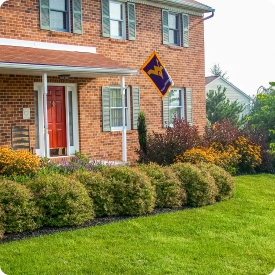It aligns well with the contemporary lifestyle balancing minimalism efficiency, and functionality and incorporates eco-friendly elements.
The best modern landscaping design ideas make a seamless transition between outdoors and indoors, improve the visual appeal, and increase property value. But, what is modern home landscape design, and is it a good option for you?
Modern landscaping design focuses on clean lines, and geometry, and prioritizes minimalistic style.
So, if you are ready to transform your outdoor space to enhance its use and make it more beautiful, read more about the modern landscape style below.
Key Principles of Modern Landscape Design
To understand better modern style and how it differs from traditional landscaping, let’s explore its key principles.
Simplicity and Minimalism
Unlike traditional style, modern landscape architecture is based on simple and clean lines and minimal details, which work together to create perfect harmony. The straight lines are often seen in:
- Straight paths and walkways – Create a direct flow through the yard
- Plant beds – Emphasize symmetry and geometrical shapes
- Borders – Linear borders throughout the gardens
- Water features – Rectangular ponds
- Hardscaping elements – straight walls and fences
In general, modern style is based on a minimalistic approach without excessive ornamentation and minimal clutter.
Functional Spaces
The value of the modern landscape is that each element has a function, from beautifully arranged comfortable seating areas to decorative garden beds. In addition, with modern landscaping, designers strive to improve the functionality of each area, often assigning spaces to multiple services.
For example, you can have a beautiful patio to use for both relaxation and dining purposes.
Integration with Architecture
Landscape design modern architecture compliments the modern architecture in several ways:
- Elements alignments – Landscape elements align with home architecture
- Color pallet – All plants and hardscape material blend with the home exterior
- Materials – Similar materials are used for landscape and architecture; for example, stone, brick, etc.
- Proportion – Landscape elements are in proportion with the size of the home.
- Repetitive angles and lines – Architectural elements are pulled into the landscape.
- Home orientation – Landscape elements highlight the home’s relationship to sunlight.
Such a design creates a cohesive look and a seamless transition between different areas.
Use of Modern Materials
Choosing materials for your front and backyard modern landscape design has a big impact on the entire visual appearance and design cohesiveness. Focus on modern and industrial materials such as:
- Concrete – Versatile and durable
- Stone – Sleek look, available in a range of colors
- Glass – It adds a touch of luxury and transparency outdoors
- Wood – Maintain a clean appearance
- Steel – Suitable for contemporary and industrial style
The key to creating a stunning design is to counterbalance modern material with natural elements, such as grasses, large-leaved plants, succulents, and evergreens.
Sustainability
Landscape design for modern homes shows the trend of adding eco-friendly features and sustainable landscaping practices. These don’t interfere with native and unique landscape features. Instead, they enhance them and create a uniform design without causing damage to the environment.
Best examples of eco-friendly practices in modern landscaping designs are native plant selection, rainwater harvesting, organic lawn care, composting, and mulching.
Some homeowners go a step further in their eco-friendly practices and create wildlife habitats, adding food and shelter to wildlife. In addition, in dry areas, eco-conscious landscapers plant drought-tolerant plants to conserve water.
You can also add design elements to enhance the energy efficiency of the space or home, by strategically planting trees to add shade and reduce the need for AC.
Design Elements in Modern Residential Landscapes
Modern backyard landscape design is based on minimalism, with a careful configuration of plants, pathways, lighting, and similar features.
Plant Selection
Modern landscape features clean lines and minimal maintenance, to agree with the busy lifestyle and lack of time for complex gardening projects.
If you want to achieve a modern landscape, focus on native plants that thrive in your climate. Explore low-maintenance plants suitable for your hardiness zone.
For example, if you live in Lancaster, Pennsylvania, hardiness zone 7a, pick grasses such as Chinese silver grass for vertical appeal, and Blue mountain grass for a unique texture.
Succulents are also a great idea for a variety of climates because they are drought-tolerant and look attractive in all outdoor settings.
Hardscaping
Hardscape features that are in harmony with architecture require careful design and material selection. Focus on geometrical pathways and driveways, made from concrete pavers, gravel, or stone.
A common feature in modern landscape designs is a retaining wall. When you strategically place it, you’ll improve functionality and aesthetics. Retaining walls add support to natural slopes and create wonderful terraces you can use for flower beds.
Water Features
More homeowners include wonderful water features into their landscapes to add focal points in the backyard and increase home resale value. You can opt for:
- Infinity pools
- Minimalist ponds with straight lines
- Water walls
- Linear fountains
- Overflowing bowls
To fully respect the principles of modern and sustainable landscaping, use water features that recycle water so you’ll minimize waste.
Lighting
Lighting is an essential feature of the front yard modern landscape design. When chosen wisely, lighting improves safety and also highlights key design features, creating a wonderful ambiance at night.
Common options for lighting fixtures in modern landscaping are:
- Downlights – Adding soft glow on paths
- Spotlights: Highlight specific design features.
- Floodlights: Illuminate driveways.
- Walkway and in-ground lights – Improve safety and add a subtle effect
- Wall-mounted fixtures: Ambient lighting
- Solar lights: Eco-friendly, low-maintenance lighting.
- LED strip lights: Versatile lighting for outlining hardscaping elements or adding focal points.
Outdoor Living Spaces
Modern landscaping is a combination of multi-purpose design elements and gorgeous features. As part of the current lifestyle, more homeowners seek a connection with nature, through outdoor living spaces.
The key is to make your outdoor space practical, beautiful, and comfortable. You can achieve that by selecting modern, minimalistic furniture and fixtures to remain in the same style. Pick:
- Sleek lounge chairs or sofas
- Geometric coffee tables and dining furniture
- Modular seating adds versatility
- Hammocks, swings, and daybeds to improve comfort and aesthetics
If you want to create an entertaining space and a gathering spot for the entire family, hire professionals to help you build fire pits and an outdoor kitchen to add warmth and create a welcoming atmosphere.
Steps to Achieve Modern Residential Landscape Design
You can achieve the transformation of your current space into a modern functional and lovely landscape through several steps:
- Site assessments – Conduct a thorough analysis of the current landscape condition, to identify issues, and come up with ideas and preferences
- Planning – Create a detailed plan which focuses on solving issues, and featuring modern design elements; add sketches and a list of materials
- Plant selection – Visit local nurseries and gardening centers to research more about plants and select them for your landscape, so they fit into modern aesthetic, and sustainability principles and don’t require too much maintenance
- Design implementation – Prepare the site and clean everything before you move on to the hardscaping elements, followed by planning and adding light and decorative features; Some hardscaping structures may require professional installation to ensure everything is installed properly; inspect the design for functionality and address the issues you have encounter
- Landscape maintenance – Determine what steps you need to include in regular and seasonal landscape maintenance, such as pruning, cleaning, watering, pool maintenance, wildlife feeding, etc.
Conclusion
Even though the traditional landscape has its perks, it is too ornamental and not nearly as functional as the modern landscape.
Clean lines, symmetry, improved functionality, increased safety, and minimal maintenance, as core features of the modern landscape, represent and complement modern lifestyles better.
You can contact Integrity Land Works for the best modern landscape ideas and practices, tailored to your exact needs and preferences.
FAQ
Which materials do professional landscapers choose for modern landscape design?
Professionals create great modern landscapes with a combination of concrete, steel, glass, and stone or wooden accents and add balance to the industrial materials and natural elements.
How to make modern home landscape design more eco-friendly?
You can collect rainwater for watering, install solar lights, reduce chemical use, pick native plants, and plant fruits and veggies to maximize functionality and minimize waste.
Is modern home landscape design better?
Compared to a traditional landscape, modern is indeed easier to maintain and is more eco-friendly. However, it may look too sterile with its minimalistic features to homeowners preferring vivid, floral landscapes.
What water features are easiest to incorporate in modern residential landscape design?
Overflowing bowls are the simplest to add to your outdoor area, and are suitable for DIY projects. Still, overflowing bowls have a beautiful impact on the overall appearance of your landscape.

